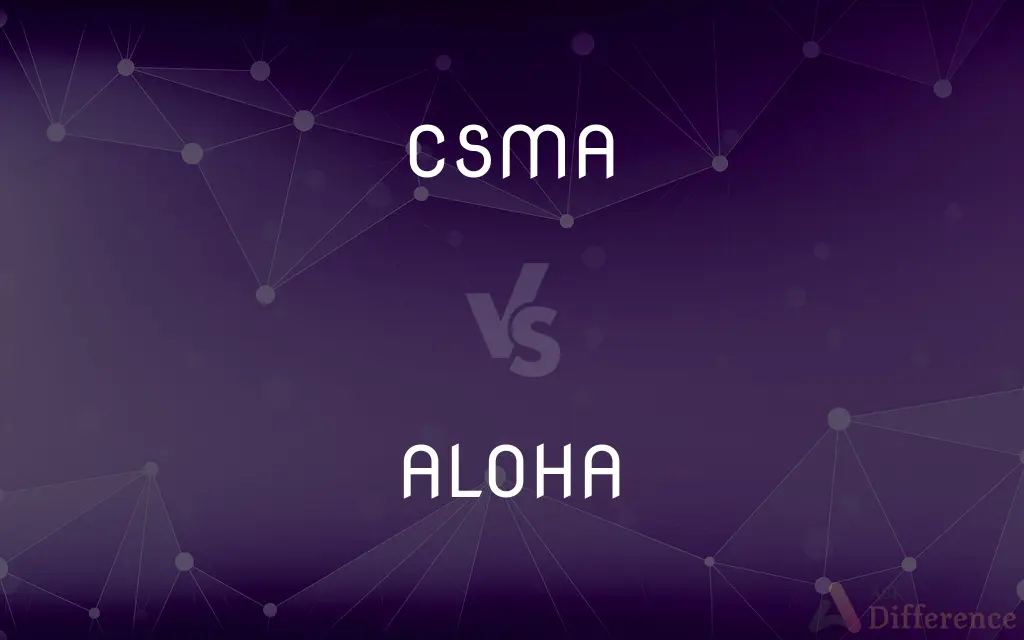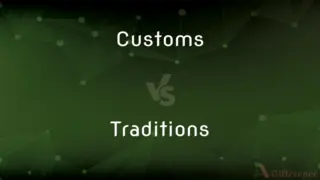CSMA vs. ALOHA — What's the Difference?
By Tayyaba Rehman & Fiza Rafique — Published on February 16, 2024
CSMA (Carrier Sense Multiple Access) checks if a channel is free before transmitting data, while ALOHA simply sends data, potentially leading to collisions.

Difference Between CSMA and ALOHA
Table of Contents
ADVERTISEMENT
Key Differences
CSMA (Carrier Sense Multiple Access) and ALOHA are two protocols used in network communications to manage how data is transmitted over a shared medium. CSMA is designed to reduce data packet collisions by having the transmitting device first check the channel for the presence of a carrier signal indicating that the channel is in use. If the channel is found to be free, the device proceeds with the transmission; if not, it waits for a random period before checking again. ALOHA, on the other hand, is a simpler protocol where the transmitting device sends data whenever it has data to send, without checking if the channel is currently in use. This approach can lead to high collision rates, especially in busy networks, as multiple devices may attempt to transmit data simultaneously.
The key difference between CSMA and ALOHA lies in their approach to handling potential data collisions. CSMA's method of sensing the channel before transmission significantly reduces the likelihood of collision, making it more efficient in environments where the network medium is heavily utilized. ALOHA's method, while simpler and requiring less complex hardware, suffers from inefficiency due to the high possibility of collisions, which require data packets to be resent, thus increasing the total time taken for successful data transmission.
The original ALOHA protocol was the first of its kind to address the problem of scheduling transmissions in a shared communication medium and was developed for use in wireless networks in Hawaii, giving it its name. Its simplicity was revolutionary at the time of its creation. However, as network demands grew, the need for more efficient collision handling became apparent, leading to the development of protocols like CSMA. CSMA has since evolved into several variations, such as CSMA/CD (Collision Detection) used in Ethernet networks and CSMA/CA (Collision Avoidance) used in wireless networks, each tailored to optimize performance in different network environments.
Choosing between CSMA and ALOHA depends on the specific requirements of the network, including factors like the expected volume of traffic, the cost and complexity of network hardware, and the need for efficient use of bandwidth. CSMA is generally preferred for most modern wired and wireless networks due to its greater efficiency in managing data collisions. However, the ALOHA protocol still has historical significance and can be seen as a foundational technology that paved the way for the development of more advanced network protocols.
In summary, while both CSMA and ALOHA protocols facilitate data transmission over a shared communication medium, CSMA's carrier-sensing mechanism offers a more efficient solution for managing data collisions compared to ALOHA's send-and-possibly-collide approach. The evolution from ALOHA to CSMA reflects the growing complexity and demands of network communication technologies.
ADVERTISEMENT
Comparison Chart
Collision Handling
Checks channel before transmitting
Transmits without checking, leading to collisions
Efficiency
Higher, due to reduced collisions
Lower, due to frequent collisions
Protocol Complexity
More complex, requires channel sensing capability
Simpler, no need for sensing capability
Variants
CSMA/CD, CSMA/CA for different environments
Pure ALOHA, Slotted ALOHA
Suitable Environments
Busy networks where efficiency is critical
Less congested networks or where simplicity is prioritized
Compare with Definitions
CSMA
Reduces data transmission collisions through carrier sensing.
CSMA significantly reduces network downtime by minimizing collision instances.
ALOHA
Features variants like Pure ALOHA and Slotted ALOHA to improve efficiency.
Slotted ALOHA improves on Pure ALOHA's efficiency by dividing time into discrete slots.
CSMA
Protocol that senses the communication channel's status before transmitting.
To avoid collisions, our network implements CSMA to check if the channel is clear.
ALOHA
Prioritizes simplicity and ease of implementation over collision avoidance.
For our small-scale project, ALOHA's simplicity outweighs its inefficiency.
CSMA
CSMA variations include CSMA/CD and CSMA/CA for wired and wireless networks, respectively.
Ethernet networks utilize CSMA/CD to detect and manage collisions efficiently.
ALOHA
A simple network protocol that sends data whenever available, risking collisions.
ALOHA's straightforward approach simplifies transmission at the cost of potential data collisions.
CSMA
Enhances network traffic efficiency by waiting for a clear channel.
CSMA ensures efficient use of network bandwidth by preventing simultaneous transmissions.
ALOHA
The first wireless communication protocol to manage data in shared channels.
The pioneering ALOHA protocol laid the groundwork for modern wireless communication.
CSMA
Suitable for high-traffic networks needing efficient data flow management.
In our busy office network, CSMA is crucial for maintaining smooth communication.
ALOHA
Less efficient in environments with heavy traffic due to collision risks.
In our high-traffic network, ALOHA's collision rate led to significant data delays.
Common Curiosities
Can ALOHA work in modern networks?
It's less suitable for modern, high-traffic networks due to its high collision rate.
What are the main variants of CSMA?
CSMA/CD for collision detection and CSMA/CA for collision avoidance.
What does ALOHA stand for?
A protocol that allows data transmission without checking for potential collisions.
Why might a network choose ALOHA over CSMA?
For its simplicity and ease of implementation in less congested environments.
How does CSMA/CD detect collisions?
It listens to the channel while transmitting to detect simultaneous transmissions.
What differentiates Pure ALOHA from Slotted ALOHA?
Slotted ALOHA divides time into slots to reduce collisions, unlike Pure ALOHA.
What is CSMA?
A network protocol that senses the channel before transmitting to avoid collisions.
What's the efficiency difference between CSMA and ALOHA?
CSMA is generally more efficient due to its proactive collision avoidance strategy.
How does CSMA improve network efficiency?
By reducing collisions through carrier sensing, it ensures smoother data transmission.
Is CSMA used in wired or wireless networks?
It's used in both, with specific variants like CSMA/CA tailored for wireless networks.
Can ALOHA's collision issue be mitigated?
Slotted ALOHA mitigates this by organizing transmissions into timed slots.
Why is CSMA considered complex?
Because it requires hardware capable of sensing and reacting to channel conditions.
What scenario best suits the use of ALOHA?
Small-scale, low-traffic networks where simplicity and cost are primary concerns.
How do network conditions affect the choice between CSMA and ALOHA?
The choice depends on network traffic levels, the need for efficiency, and implementation complexity.
How does CSMA/CA prevent collisions in wireless networks?
It uses acknowledgments and backoff algorithms to avoid and manage collisions.
Share Your Discovery

Previous Comparison
Customs vs. Traditions
Next Comparison
POSB vs. DBSAuthor Spotlight
Written by
Tayyaba RehmanTayyaba Rehman is a distinguished writer, currently serving as a primary contributor to askdifference.com. As a researcher in semantics and etymology, Tayyaba's passion for the complexity of languages and their distinctions has found a perfect home on the platform. Tayyaba delves into the intricacies of language, distinguishing between commonly confused words and phrases, thereby providing clarity for readers worldwide.
Co-written by
Fiza RafiqueFiza Rafique is a skilled content writer at AskDifference.com, where she meticulously refines and enhances written pieces. Drawing from her vast editorial expertise, Fiza ensures clarity, accuracy, and precision in every article. Passionate about language, she continually seeks to elevate the quality of content for readers worldwide.













































